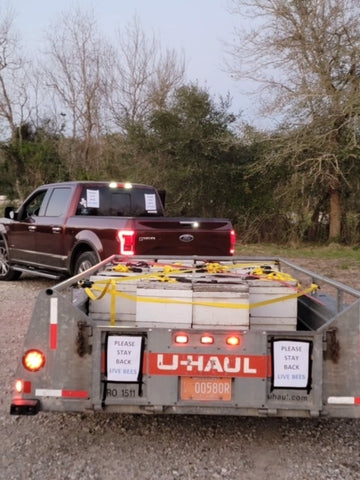Moving Hives
By: Chari Elam
Long distance move (beyond your property)
Prepare the location you are moving your bees to.
- Move bees at night if possible. You can move bees in the daytime but know that you’ll lose some foragers.
- Close off their entrance prior to moving.
-Smoke the bees back inside when closing off the entrance. Products such as vinyl corner bead work well – the bees can get ventilation and are secured. Staple it on with a hand stapler. They do not like this so be well suited.
- Secure the bottom board to the bottom box, and top box to bottom box with hive staples.
- Use a ratchet strap (not tension strap) to ratchet the entire hive together “tightly.” -Do not take this step lightly. The boxes need to be very secure in transporting to prevent the boxes from shifting.
- Load using a helper or hive carrier
-A double deep box full of bees and resources can weigh 75 lbs. or more. Be prepared!
-When using a hive carrier use caution that the notch handles don’t slip out of the hive box it’s carrying.
- When loading into a truck or on a trailer, face hive entrances to the rear or side if possible (avoiding direct wind blowing into the entrance).
- Strap hives down to the vehicle transporting the bees.
-It’s ok to load bees side by side with no space between the sides of boxes.
-Take time to truly secure your bees on the transport vehicle.
- Don’t delay getting your bees to their new location
-Your bees will be ready to get off and their entrances open so don’t delay this step.
-If transporting your bees for long distances in hot weather use caution for extended stops. Commercial beekeepers moving bees a long distance will install nets over their bees and water them down on prolonged stops to “cool” the hives. Small scale beekeepers can do the same or consider laying a wet blanket or sheet over the tops of the hives to cool them down if necessary.
- Once you have arrived at the new location, unload your bees promptly.
-Remove the ratchet straps. You can leave the staples in the hive boxes for now
-Remember, your bees just made a trip, and they are not happy! -Open the hive entrance.
-Wear your bee suits!! Again, they are NOT happy from the ride!
- Consider feeding once they’ve settled. Unless it’s nectar flow – giving the bees some food will calm them and settle them quickly.
Short Distance Move
Follow the first 5 steps for moving a hive a long distance.
- If you’re moving to the other side of your yard or property you can use a wagon, golf cart, or other means.
-This method will “jog” the bees more than a car/truck/trailer and they’ll not be happy about that so act accordingly.
- If you want to move your bees only “feet” from their original location –
-You can place them on a wagon or another “wheeled” device and move them just a foot or so a day with the entrance facing the same direction.
-If you need to reorient the direction the entrance is facing, do so gradually by turning the box just a few inches a day until the direction desired is achieved.
- If you have to move your bees “today” and don’t have time to move them a short move each day –
-Move the hive to its new location in the yard and place an “object” at the old location such as a brick or piece of wood.
-This will give the bees something to land on.
-Each afternoon for several days, pick up the “object” and take it to the moved hive and shake the bees off at the entrance. They eventually get the point.

-Also - Place an “obstruction” like a branch standing up about a foot in front of the hive entrance to create an obstacle at the entrance.
-This will force the bees to “reorient” themselves and help them adapt to their new location - Plus prevent them from returning to their old one. Remove the obstruction after a week.
Moving bees isn’t hard – BUT it does take forethought. Take it slow, think through each step, wear protective gear (even for sweet bees), therefore minimizing any issues.


